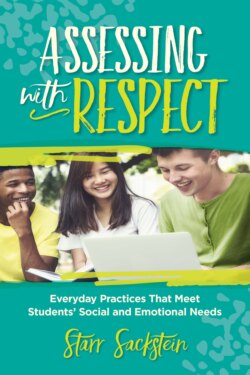Читать книгу Assessing with Respect - Starr Sackstein - Страница 23
На сайте Литреса книга снята с продажи.
Teacher-Leadership Relationships
ОглавлениеA big part of school culture plays out in hallways, administrative offices, and meeting spaces. Your relationships with peers and school and district leaders can model for students what to do or what not to do in some situations. Furthermore, because schools or districts often dictate which assessments must be given and how, as well as what data are to be collected, having positive relationships with key decision makers is essential to making sure that you are supported in the choices you make to best serve your students.
Ultimately, the better your relationships with building and district leaders, the more inclined you will be to speak out about the needs of your learners and advocate on their behalf. When relationships at this level break down, students and families may get misleading or conflicting messages that can only complicate the learning process. Presenting a strong, cohesive front for students and the community allows systems and the people within them to focus their time on learning rather than on dispelling misconceptions.
Leadership can promote positive relationships by having open-door policies and inviting teacher feedback related to school or districtwide initiatives. Just as in classroom communities, voices need to be honored and respected in the wider school community. Rather than having a culture in which directives are created at the top and then passed down without input, districts need to invite the voices of those who do the daily work and listen to their feedback. These open dialogues will make for more open and trusting relationships that will also help teachers improve through their observations and other initiatives. When teachers trust their leaders and leaders trust their teachers, kids win.
If leadership also provides opportunities for teachers to work together and strengthen their ties, the results can include clearer understandings of the characteristics of grade-level and content-area mastery. Teachers need time to work together, build their own collegial relationships, and come to consensus about what successful learning looks like so that all students are getting the same message.
